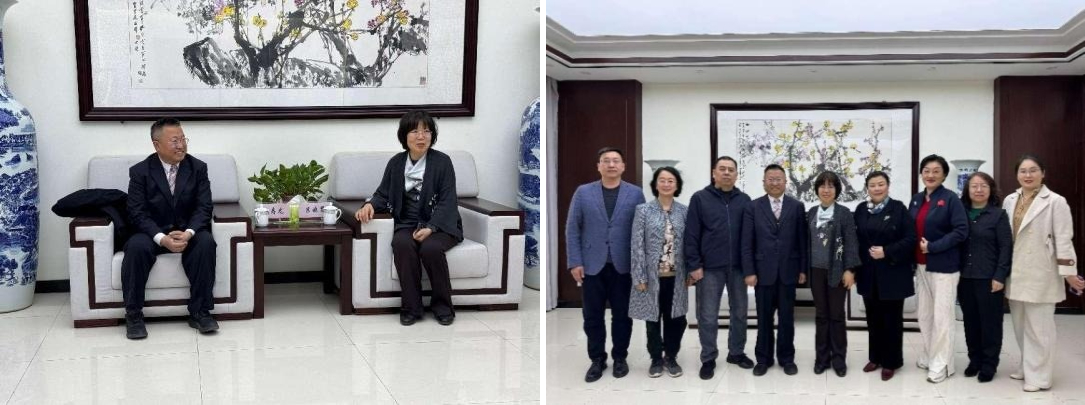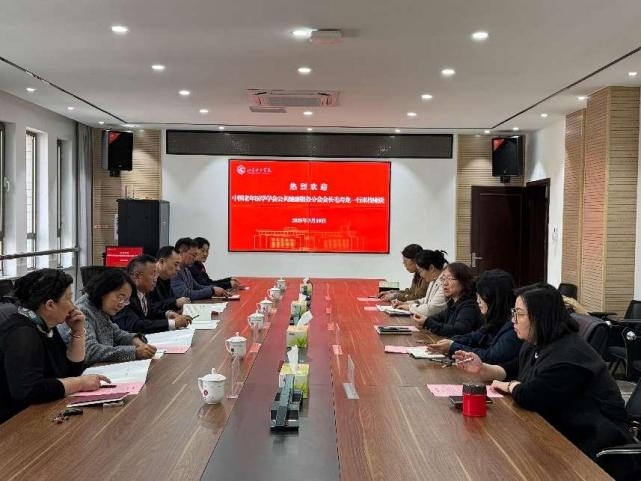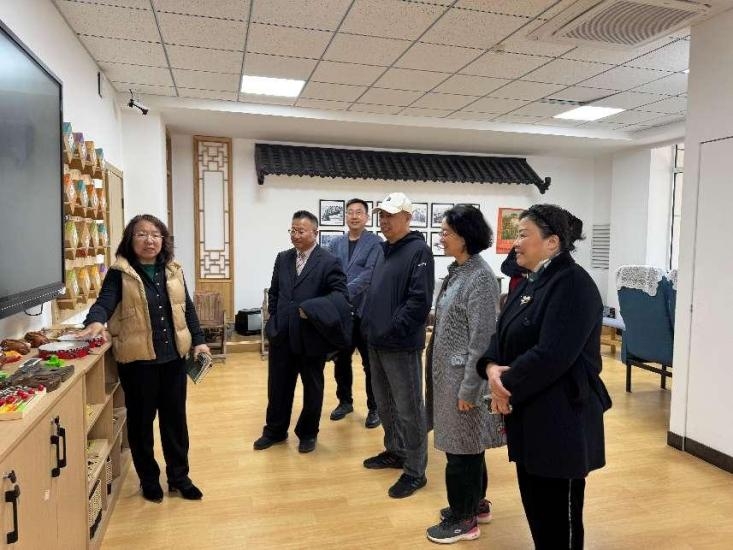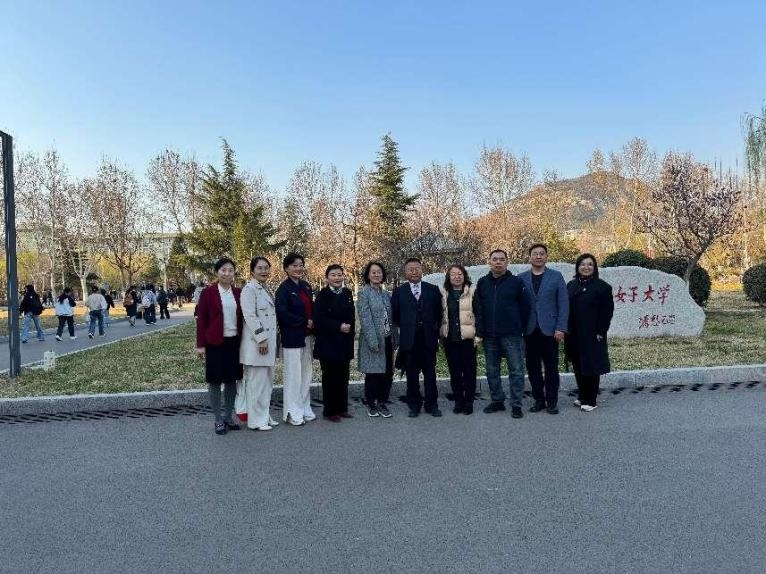The Public Health Service Branch of the Chinese Society of Geriatrics and Shandong Women's University have established a strategic partnership to jointly draw a blueprint for the development of healthy elderly care
On March 19, 2025, Professor MAO Shoulong, the president of the Public Health Service Branch of the Chinese Geriatrics Society, led a delegation of five people, including General Director Zhang Lianshan, Deputy General Director Lin Yong, Deputy General Director Dong Jianmin, and Standing Committee Member Wang Haiping, to visit Shandong Women's University. Lu Xiaoli, the Party Secretary of the university, Yan Xiaohong, the Director of the Academic Affairs Office and the Dean of the College of Health and Elderly Care, and Zhao Lili, the Party Secretary of the College of Health and Elderly Care, attended the symposium. Both sides plan to carry out in-depth cooperation in areas such as think tank construction, talent cultivation, academic discussions, and skills improvement in the field of health and elderly care, jointly addressing the challenges of population aging and injecting new impetus into the Healthy China strategy.

Focusing on the construction of characteristic disciplines, Shandong Women's University is building a highland for cultivating talents in health care and elderly care
At the symposium, Secretary Lyu Xiaoli elaborately introduced the educational philosophy and discipline development plan of Shandong Women's University. As one of the first universities in the country to offer an undergraduate program in elderly care service management, this university accurately grasps the pulse of social demands, proactively responds to the needs of an aging society, and focuses on building three major discipline clusters: children's education, health care for the elderly, and family construction, thus forming a professional characteristic of "one elderly and one child". Among them, the health and elderly care discipline group is based on the national first-class undergraduate major of social Work, integrating majors such as elderly care service management and health service and management. Through the interdisciplinary integration model of "social work + elderly care + health", it cultivates applied and compound professional talents.

Shandong Women's University has particularly outstanding innovative practices in the field of health and elderly care: In 2020, it established one of the first batch of undergraduate programs in elderly care service management in the country, formed a multi-disciplinary integrated teaching team, introduced outstanding doctors from fields such as sociology, medicine, and management, and invited industry experts to serve as industry professors. We have established research platforms such as the "Community Governance and Health Care for the Elderly" liberal arts laboratory and the Collaborative Innovation Center. We have also collaborated with over 20 government departments and enterprises including the Jinan Civil Affairs Bureau and Jinling Health to set up industrial colleges, thus building an education model that integrates multiple subjects including government, schools and enterprises.

President MAO Shoulong introduced that the Public Health Service Branch of the Chinese Society of Geriatrics has always been focused on improving the health level of the elderly, conducting academic exchanges, organizing medical and grassroots science popularization teaching, participating in the formulation of industry standards, and is committed to talent cultivation. President MAO Shoulong stated that Shandong Women's University has achieved remarkable results in the field of health and elderly care services. The innovative measures of your university, such as the integration of industry and education and the construction of practical training bases, are impressive. He believes that there is broad space for cooperation between the two sides in the field of elderly health services, such as talent cultivation, scientific research, academic activities, etc. We look forward to working together to contribute to the cause of elderly health and achieve a win-win situation.
Deepen strategic cooperation and build an ecosystem of collaborative innovation among industry, academia and research
After mutual understanding and in-depth communication, both sides have reached a consensus on cooperation in multiple aspects and decided to fully utilize their respective advantages to carry out in-depth cooperation in the following fields:
1. Think tank construction: Relying on the platform resources of the Public Health Service Branch of the Chinese Society of Geriatrics and the research advantages of Shandong Women's University, a think tank for health and elderly care research will be jointly established. It will focus on areas such as elderly health management, integration of medical care and elderly care, and smart elderly care to conduct policy research and standard formulation, providing intellectual support for government decision-making.
2. Talent Cultivation: Jointly design the "theory + practice" curriculum system, promote the two-way flow model of "teachers leading positions and industry experts leading courses", on the one hand, continuously improve the quality of undergraduate education on campus, and on the other hand, strengthen the training of social elderly care service talents, develop vocational certification training programs such as "Health Manager", "Geriatric Assessor", and "Elderly Care Worker", Meanwhile, emphasis is placed on cultivating senior managers of elderly care institutions.
3. Academic Exchange: Regularly hold national academic exchange conferences on health and elderly care, inviting domestic and foreign experts and scholars to share cutting-edge achievements, and jointly apply for national-level scientific research projects to promote technological innovation and transformation of achievements in geriatric medicine and the health industry.
4. Skill Enhancement: Jointly organize the national college students' elderly care service skills display and evaluation, build a platform of "promoting learning and training through evaluation", and enhance the professional skills and vocational qualities of practitioners.
Empowering the development of the elderly care industry through cooperation is of profound significance
The conclusion of this strategic cooperation intention is an important measure to implement the national strategy of actively responding to population aging. The cooperation between the two sides will effectively promote the in-depth integration of industry and education, facilitate the organic connection between the education chain, talent chain, industrial chain and innovation chain, provide the elderly care industry with compound talents who possess both professional capabilities and humanistic care, improve the quality of talent cultivation, and promote the standardization and professionalization of elderly care services. In the future, both sides will take this cooperation as a starting point to jointly explore the integrated development path of "education - research - practice - industry", contribute wisdom and strength to the construction of a Chinese characteristic elderly care service system, and inject new vitality into the construction of a healthy China and sustainable social development.

Prev
The "Clinical Laboratory Quality Management and Laboratory Technology Capacity Enhancement Training Course" organized by the Laboratory Medicine Branch of the Chinese Geriatrics Society was successfully held
Next
The kick-off meeting for the community project of implementing the "Community Elderly Nutrition Management Service Standards" was held in Beijing, marking a new chapter in the cause of elderly health

